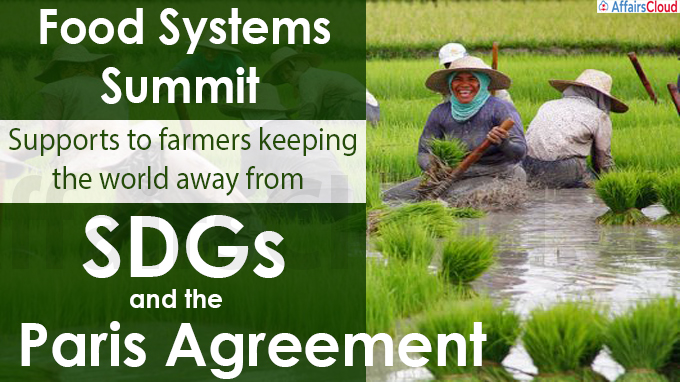 On September 14, 2021, three United Nations (UN) agencies viz. the Food and Agriculture Organization (FAO), UN Development Programme (UNDP) and UN Environment Programme (UNEP) released a report titled ‘A multi-billion-dollar opportunity: Repurposing agricultural support to transform food systems’.
On September 14, 2021, three United Nations (UN) agencies viz. the Food and Agriculture Organization (FAO), UN Development Programme (UNDP) and UN Environment Programme (UNEP) released a report titled ‘A multi-billion-dollar opportunity: Repurposing agricultural support to transform food systems’.
- The report is an analysis of countries’ support to farmers and its adverse impacts on food prices, environment, global warming and farmers, specifically smallholders.
- This report comes ahead of the UN Food Systems Summit 2021 which will be held during the UN General Assembly (UNGA) in New York, United States (US) on September 23.
Objective of Report:
To inform the countries about the negative side of agro funding which is keeping the world away from achieving Sustainable Development Goals (SDGs), therefore, an alarming need to reform the agriculture support systems.
How supporting to farmers is affecting the well-being and environment?
i.The contemporary food production system emits high greenhouse gas (GHG) and the support is being provided for the most emission-intensive sectors like sugar and the beef production chain.
ii.Increase in industrial food production and consumption led to non-communicable diseases.
iii.The support and incentives are targeted at a few commodities thus not benefiting all farmers. Also, they incentivise production practices and behaviours that might be harmful to the health, sustainability, equity and efficiency of food systems.
iv.The current support systems had invariably helped corporates more than producers.
Key Figures regarding Support:
i.It should be noted that annually $540 billion are used as a support to farmers which would be increased to triple by 2030 to $1.759 trillion.
- Out of this 87% of the support i.e. $470 billion is price distorting and environmentally and socially harmful.
ii.Of the total support, $294 billion was paid in the form of price incentives and around $245 billion as fiscal subsidies to farmers.
iii.Only $110 billion was used to support infrastructure, research and development and benefitted the general food and agriculture sector.
What report said as a solution?
i.The report called to repurpose the support, denying its negative implications, as most of the support is in emission-intensive and environment unfriendly sectors.
- To reduce the negative impacts, efforts like the Indian state of Andhra Pradesh should be initiated that adopted a policy of Zero Budget Natural Farming.
ii.High-income countries should decrease their support to the meat and dairy industry that accounted for 14.5% of global GHG emissions.
iii.For low income countries, the support to chemical pesticides and fertilizers should be trimmed and also to discourage monoculture (cultivation of a single crop in a given area).
Six-step recommendation by Report to the Governments for repurposing process:
- Measuring the support provided
- Understanding its positive and negative impacts,
- Identifying repurposing options,
- Forecasting their impacts,
- Refining the proposed strategy and detailing its implementation plan,
- Monitoring the implemented strategy.
Recent Related News:
United Nations World Food Programme (WFP) in India and the Rajasthan government’s Department of Food and Civil Supplies established a partnership to improve the Targeted Public Distribution System (TDPS), world’s largest food safety net scheme in Rajasthan.
About United Nations Development Programme (UNDP):
Establishment– 1965
Administrator– Achim Steiner
Headquarters– New York, United States of America
About United Nations Environment Programme (UNEP):
Establishment– 1972
Executive Director– Inger Andersen
Headquarters– Nairobi, Kenya




